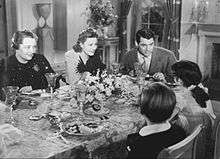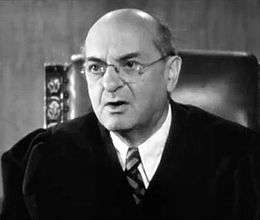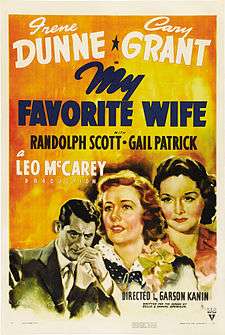My Favorite Wife
| My Favorite Wife | |
|---|---|
|
Theatrical release poster | |
| Directed by |
Garson Kanin James Anderson (assistant) |
| Produced by | Leo McCarey |
| Written by |
Leo McCarey Samuel and Bella Spewack Garson Kanin John McClain |
| Starring |
Irene Dunne Cary Grant Randolph Scott Gail Patrick |
| Music by | Roy Webb |
| Cinematography | Rudolph Maté |
| Edited by | Robert Wise |
| Distributed by | RKO Radio Pictures |
Release dates |
|
Running time | 88 minutes |
| Language | English |
| Budget | $921,000[1] |
| Box office | $2,057,000[1] |
My Favorite Wife (released in the U.K. as My Favourite Wife) is a 1940 screwball comedy produced and co-written by Leo McCarey and directed by Garson Kanin. The picture stars Irene Dunne as a woman who returns to her husband and children after being shipwrecked on a tropical island for several years, and Cary Grant as her husband. The story is an adaptation of Alfred Lord Tennyson's poem, "Enoch Arden"; in tribute, the main characters' last name is Arden. The supporting cast features Gail Patrick as the woman Arden has just married when his first wife, now declared dead, returns, and Randolph Scott as the man with whom his wife had been marooned. My Favorite Wife was RKO's second-biggest hit of 1940.
Plot
After seven years, lawyer Nick Arden (Cary Grant) has his wife Ellen (Irene Dunne), missing since her ship was lost, declared legally dead so he can marry Bianca (Gail Patrick). It turns out however that Ellen was merely shipwrecked on a deserted island, and has been rescued. When she returns home, she learns that Nick has just left on his honeymoon with his second wife.

When Ellen tracks him down before his honeymoon night, he is at a loss as to how to break the news to Bianca. He keeps putting off the unpleasant business. Meanwhile, Bianca becomes frustrated by Nick's odd behavior (especially the non-consummation of their marriage) and calls in a psychiatrist, Dr. Kohlmar (Pedro de Cordoba). Further complications ensue when an insurance adjuster (Hugh O'Connell) mentions to Nick a rumor that Ellen was not alone on the island, but had the company of a Stephen Burkett (Randolph Scott) and that they called each other "Adam" and "Eve". When Nick confronts Ellen, she recruits a mousy shoe salesman (an uncredited Chester Clute) to pretend to be Stephen, but Nick has already tracked down the real, appallingly virile and handsome Stephen (Randolph Scott).
Nick tries to explain the situation to Bianca and Dr. Kohlmar, but they do not believe him ... until he is arrested on a charge of bigamy. In court, Judge Bryson (Granville Bates), the same judge who had Ellen declared legally dead and also married Nick and Bianca, annuls the second marriage. By this time, Ellen is no longer sure of Nick's feelings for her. Stephen asks her to marry him and return with him to the island, but she still loves Nick. In the end, Nick and Ellen are reconciled.
Cast
- Irene Dunne as Ellen Wagstaff Arden
- Cary Grant as Nick Arden
- Randolph Scott as Stephen Burkett
- Gail Patrick as Bianca Bates
- Ann Shoemaker as Ma, Nick's mother
- Scotty Beckett as Tim, the Ardens' son
- Mary Lou Harrington as Chinch, the Ardens' daughter
- Donald MacBride as Hotel clerk
- Hugh O'Connell as Johnson, the insurance adjuster
- Granville Bates as Judge Bryson
- Pedro de Cordoba as Dr. Kohlmar
Production
"On My Favorite Wife," recalled Gail Patrick, "we were desperately trying to be funny as our producer, Leo McCarey, lay at death's door from an automobile crash. He recovered but I never thought we entered into the spirit of that one. We couldn't—we were waiting for bulletins from the hospital."[2]:290
After the great success of The Awful Truth (1937), McCarey signed Cary Grant and Irene Dunne for the film without a script.[3]:419–420 He was to have directed My Favorite Wife, as well, but after his near-fatal car accident Garson Kanin was assigned as director.[4]:148 A number of pre-production conferences took place in the hospital, and McCarey recovered sufficiently to visit the set two or three weeks into filming.[3]:418
When the shooting was finished McCarey edited the film, and a preview was arranged. McCarey later recalled that "after about five reels the picture took a dip, and for about two reels or more it wasn't as funny as what preceded it … it was a lot of unraveling of a tricky plot." A second preview confirmed that the film broke down at exactly the same point.[3]:418–419

So the cast was dismissed, the writers went home, the director went back to New York and I sat there with the cutter trying to figure out what to do to save the picture. … Then I got the wildest idea I ever had. There was a judge in the opening who was very funny, and he dropped out of the picture, and I decided to bring him back. What we actually did was to tell the judge our story problems in the picture and have him comment on them. And it was truly great. It became the outstanding thing in the picture.[3]:418–419
McCarey brought Kanin and one of the writers back, and wrote the judge's dialogue himself—with help from Gail Patrick, who had studied law. One reel was shot and two or three were pulled. When the film was previewed again, it worked.[3]:419
Patrick later said she felt that the resolution of the film should have included a romance between her character, Bianca, and Stephen Burkett (Randolph Scott). "I suggested that," Patrick said, "but the director [Garson Kanin] said I was going too far."[5]
Reception
My Favorite Wife was RKO's second-biggest hit of 1940, after Kitty Foyle,[4]:144 earning a profit of $505,000.[4]:148
"Both in theme and execution, My Favorite Wife was a quasi-sequel to The Awful Truth," wrote RKO studio chronicler Richard B. Jewell. "The film peaked about two-thirds of the way along and began to wear thin near the end, yet still contained a number of inspired scenes."[4]:148
Pauline Kael assessed My Favorite Wife as "the most famous and the funniest" modern version of Tennyson's story, "Enoch Arden" (1864). "Garson Kanin was 27 (and at his liveliest) when he directed this screwball-classic hit," wrote The New Yorker film critic.[6]
Awards
The film was nominated for three Academy Awards for Best Story, Best Score and Best Art Direction by Van Nest Polglase and Mark-Lee Kirk.[7]
Adaptations
Radio
My Favorite Wife was presented on Philip Morris Playhouse October 31, 1941. Madeleine Carroll and Burgess Meredith starred in the adaptation. The broadcast does not survive in radio collections.[8][9]
Film
Something's Got to Give
20th Century Fox began filming a 1962 remake starring Marilyn Monroe, Dean Martin, and Cyd Charisse under the working title of Something's Got to Give, which was to be directed by George Cukor. There were problems from the beginning, mostly due to Monroe's failure to show up on time for work. Monroe was fired and Martin backed out when the studio attempted to recast Monroe's role with Lee Remick. A recreation of surviving footage cobbled from the unfinished Something's Got to Give exists, along with some scenes reshot with Remick.
Move Over, Darling
In 1963 20th Century Fox remade the film as Move Over, Darling, starring Doris Day and James Garner.[4]:148
The Parent Trap
The 1998 version of The Parent Trap, with Dennis Quaid and Natasha Richardson, copied the elevator scene in which Dennis Quaid sees his former wife Natasha Richardson, while he was in the elevator (nearly falling over as he keeps staring at her as the elevator door closes).[10]
See also
- Too Many Husbands, a 1940 romantic comedy film about a woman who loses her husband in a boating accident and remarries, only to have her first spouse reappear—yet another variation on the poem Enoch Arden.
- Three for the Show, the 1955 musical comedy remake of Too Many Husbands, with Betty Grable, Jack Lemmon, Gower Champion and Marge Champion.
References
- 1 2 Richard Jewell, "RKO Film Grosses: 1931–1951", Historical Journal of Film Radio and Television, Vol 14, No 1, 1994. p. 55
- ↑ Bawden, James (May 1981). "Gail Patrick". Films in Review. National Board of Review of Motion Pictures, Inc. 32 (5): 286–294.
- 1 2 3 4 5 Bogdanovich, Peter (1997). Who the Devil Made It. New York: Alfred A. Knopf. ISBN 9780679447061.
- 1 2 3 4 5 Jewell, Richard B.; Harbin, Vernon (1982). The RKO Story. New York: Arlington House. ISBN 9780517546567.
- ↑ Bawden, James (April 29, 2014). "Dream Factory Time: Gail Patrick". Classic Images. Retrieved 2015-07-25.
- ↑ Kael, Pauline (1991). 5001 Nights at the Movies. New York: Holt, Rinehart and Winston. p. 508. ISBN 0805013679.
- ↑ "NY Times: My Favorite Wife". NY Times. Retrieved 2008-12-13.
- ↑ "The Philip Morris Playhouse". The Digital Deli Too. Retrieved 2015-07-25.
- ↑ "Robinson-Zivic Fight". Harrisburg Telegraph. October 31, 1941. p. 19. Retrieved 2015-07-22 – via Newspapers.com.

- ↑ http://www.imdb.com/title/tt0120783/trivia
External links
| Wikimedia Commons has media related to My Favorite Wife. |
- My Favorite Wife at the American Film Institute Catalog
- My Favorite Wife at the Internet Movie Database
- My Favorite Wife at AllMovie
- My Favorite Wife at the TCM Movie Database
- Historic reviews, photo gallery at CaryGrant.net
